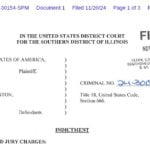Cook Co. (ECWd) –
What comes first, the chicken or the egg. In the case of legal opinions, it appears Maine Township Attorney Dowd preferred to simply bill for his services by endorsing the opinion of another attorney, who we presume never raised chickens.
The primary issue at hand is the Supervisor and her hired attorney’s position that she has free reign to hire a person to work in the Food Pantry.
It is noted, and we agree, the Food Pantry is allowed to operate under the powers provided in the Township Code, 60 ILCS 85-13. Although the attorney claims such a program comes under section (d), Health, we disagree and find it comes under (g), Social Services for the poor and aged, which Attorney Dowd agreed with.
Pelini, the attorney hired without board approval by the Supervisor who can’t seem to be honest, makes the assertion that the Food Pantry is basically a vendor and since General Assistance is either a direct financial payment or vendor payment, calling the Food Pantry a vendor would make it legal for GA funds to be paid to them as a vendor, thus legal for her to hire her friend under GA to work in the Food Pantry.
LOL! Sorry, can’t resist.
So he confirms the Food Pantry is being operated under the powers given to the Board under Township General Services. What exactly does that statute say? We ask because he conveniently failed to point out a few critical factors.
Those services are to be provided through the board’s power to expend funds for the Township directly, or through other qualified entities as described by law. Those funds, for the purpose of this statute, are from the Town Fund as it is the Board that’s given the power to expend these funds, which is not the case for General Assistance. That is how we know the Food Pantry is under the Town Board control.
“Financial aid”. A money or vendor payment to or in behalf of a recipient for basic maintenance support or medical assistance provided under Articles III, IV, V, and VI.
As the law outlines, the Financial Aid is in fact money or a vendor payment, which is either paid directly to the recipient, or to a vendor in behalf of the recipient, which is for their basic maintenance support or medical assistance. Before we get to his assertions of what is or is not basic maintenance and support we must first apply the “chicken” or the “egg” question.
He greenlights the Supervisor spending $50,000.00 to the Township Town fund creating a legal argument that it is a vendor payment for General Assistance under section 2.5 of the Public Aid Act.
Sec. 2-5. “Vendor payment” – A payment made directly to the person, firm, corporation, association, agency, institution or other legal entity supplying goods or services to a recipient.
Contained in his own opinion is evidence that he too navigated a super freighter around the world and brought it back to Maine Township. The only difference in this case from the previous attorney, this one crashed into the Dock and may have put his client in a legal quandary.
The $50,000.00 payment from General Assistance is NOT, a vendor payment. It is a “Cash Donation” to the Food Pantry. In fact, we contend it is an illegal transfer of General Assistance tax money being used to provide services under a statute that is not Public Aid. This payment clearly is NOT a vendor payment in behalf of a General Assistance recipient which is a requirement.
He also pointed out that this evidence of it being a cash donation can be found in the most recent Budget (see page 9 at this link).
Nothing in the Public Aid act permits General Assistance funds, levied for a specific purpose under 60 ILCS 1/235-20, to be expended as a Cash Donation. Such an action violates specific fund transfer powers in the Township Code as well as a violation of the Public Aid Act.
In order for a recipient to get aid, they must first apply. If they qualify, then they get paid either from General Assistance or through a vendor payment in their behalf for the aid being provided.
“Recipient”- A person who is receiving financial aid under any of the provisions of this Code, as in the Public Aid Act. I point that out because the services provided under the Township Board authority, ie the Food Pantry, is not a provision under the Public Aid Act. In fact, this same attorney confirms in his footnote 7, the Food Pantry is not under the control of the General Assistance Office nor legally obligated to provide food to GA recipients.
Considering the law defines “recipients” as those receiving financial aid (direct payment or vendor payment) under the provisions of the Public Aid act, we must ask, what provision of the Public Aid act is the Township Food Pantry?
Applying the very case law the attorney pointed to in his onion…I mean opinion, his reasoning stinks.
John Doe applies for General Assistance and qualifies. What does he qualify for and how much? Case law outlines the grant amount is determined by the Supervisor. Does anyone know what this grant figure is in Maine Township? (Johnson V City of Evanston)
Pick a figure and apply it to the law. $500.00? Ok, John Doe qualifies for $500 in General Assistance. Since he needs to eat, (not to be taken as an agreement that GA can be spent on food), we will attribute half of that amount in the form of a vendor payment for food. Who is that vendor payment made to? The lawyer says the Food Pantry.
If that is the case, then the vendor payment should be for the amount applicable to and in behalf of the recipient, in this case, John Doe.
By greenlighting a Cash Donation, there appears to be no mechanism that determines what the actual vendor payment in behalf of the recipient is. Auditors call that co-mingling of funds. It’s a common way to use funds not necessarily allowed for other purposes. In this case, clearly the Food Pantry is being subsidized with General Assistance funds.
In this case, the opinion was crafted as a means of defending the Supervisor’s hiring of her friend by claiming a Food Pantry under the control of the Town Board is now a vendor because they operate a food pantry that gives food to recipients of General Assistance.
The fact of the matter is, the chicken comes before the egg. You must first define the grant level of aid, then the recipient, and then you can determine who gets paid, the recipient or a vendor in their behalf.
We suggest a writ of mandamus action be taken against the Township Supervisor for her actions of illegally transferring General Assistance in the form of cash donations to another division of Township government by calling them a vendor. A violation because the lump sum transfer is made before knowledge of who the actual recipients of General Assistance are and no set amount for each recipient has been identified.
This cash donation is being used as a transfer of funds from General Assistance to another Township fund that operates a social service program under the Township code, not under the Public Aid Act. No such transfer of General Assistance is authorized under law. Calling their own entity a vendor to justify the cash donation is an obfuscation of the law. Such obfuscation is a willful neglect to perform the duty of Supervisor.
A writ of mandamus should be brought forward for many reasons, but at the least, under 60 ILCS 1/70-40 – Failure to perform duties; forfeiture and disqualification. If any supervisor refuses or willfully neglects to perform any of the duties of the office under the preceding Sections of this Article, he or she shall forfeit to the township the sum of $50 and shall be disqualified to act as the supervisor of the township.
It’s high time Maine Township find new legal counsel in our opinion and demand the resignation of the Supervisor.








2 Comments
Kevin duJan
Posted at 09:51h, 02 OctoberThis is a large issue in Illinois: there are law firms who deliberately (in my opinion) give public officials legal advice that says whatever the public officials want the legal advice to say. That is not how lawyers are supposed to work.
You, as a private citizen, can’t go to an attorney and hire them and then ask them for advice on how to commit a crime and get away with it. That would be unethical. The lawyer — if he or she was ethical — would refuse to have you as a client. If you lie to your attorney at any point when he/she is representing you, that is cause for the attorney to fire you as a client. You are not allowed to lie to your attorney or to ask your attorney to help you commit crimes.
Let’s look at what MANY public bodies in Illinois do: they hire attorneys who help them commit crimes. They seek out attorneys who will allow the public bodies to break the law. We are never privy to what the attorneys are telling the public bodies, but I suspect they tell them that most of these laws are not enforced and even if they break the law that the state’s attorney doesn’t prosecute so it won’t matter.
The problem is that public funds pay for all this. So the public officials have no skin in the game. They can break the law all they want knowing they will never pay any attorneys’ fees. They make the public pay that. The attorneys make a FORTUNE off of any new problem that a public body gets into.
This is like a tow truck operating company handing out maps that include areas where a car is sure to get stuck (and then need a tow truck). The company wants to make more money, so it sends cars into trouble knowing that they will then have to call the tow truck to get them out of the trouble (that the towing company got them into).
This is happening all over Illinois. And the public ends up paying huge amounts to these unethical attorneys that knowingly steer the public bodies in the messes they get into.
Chicken Little
Posted at 16:45h, 01 October“What comes first, the chicken or the egg. In the case of legal opinions, it appears Maine Township Attorney Dowd preferred to simply bill for his services by endorsing the opinion of another attorney, who we presume never raised chickens.”
Hold your horses just a minute. Following the logic of Attorney Daniel Dowd and paraphrasing his professional opinion;
“It is my opinion that it certainly could include raising chickens, but does not exclude raising chickens…” and it could include Attorney Pelini raising chickens, but does not exclude Attorney Pelini raising chickens.
On a serious note, what a tangled web these guys have woven.